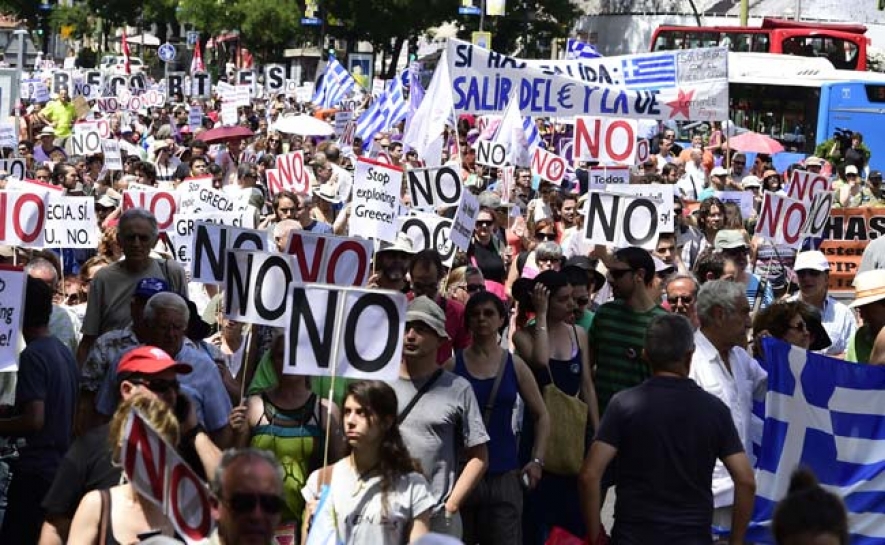With nearly half of the votes counted, official figures showed 61 per cent of Greeks rejecting the bailout offer. An official interior ministry projection confirmed the figure as close to the expected final tally.
The astonishingly strong victory by the 'No' camp overturned opinion polls that had predicted an outcome too close to call. It leaves Greece in uncharted waters: risking financial and political isolation within the euro zone and a banking collapse if creditors refuse further aid.
But for millions of Greeks the outcome was an angry message to creditors that Greece can longer accept repeated rounds of austerity that, in five years, had left one in four without a job. Prime Minister Alexis Tsipras has denounced the price paid for aid as "blackmail" and a national "humiliation".
Hundreds of Greeks began pouring into the central Syntagma square in front of parliament to celebrate, after a week of building desperation as banks were shut and cash withdrawals rationed to prevent a collapse of the Greek financial system.
"This is an imprint of the will of the Greek people and now it's up to Europeans to show if they respect our opinion and want to help," said Nikos Tarasis, a 23-year-old student.
Officials from the Greek government, which had argued that a 'No' vote would strengthen its hand to secure a better deal from international creditors after months of wrangling, immediately said they would try to restart talks with European partners.
"I believe there is no Greek today who is not proud, because regardless of what he voted he showed that this country above all respects democracy," Labour Minister Panos Skourletis said.
"The government now has a strong mandate, a strong negotiating card, to bring a deal which will open new ways."
But euro zone officials shot down any prospect of a quick resumption of talks. One official said there were no plans for an emergency meeting of euro zone finance ministers on Monday, adding the vote outcome meant the ministers "would not know what to discuss".
Many of Athens' partners have warned over the past week that a 'No' vote would mean cutting bridges with Europe and driving Greece's crippled financial system into outright bankruptcy, dramatically worsening the country's economic depression.
The result also delivers a hammer blow to the European Union's grand single currency project. Intended to be permanent and unbreakable when it was created 15 years ago, the euro zone could now be on the point of losing its first member with the risk of further unravelling to come.
"I believe such a result can be used as a strong negotiating tool so that Europeans can understand that we are not a colony," said Nefeli Dimou, a 23-year-old student in Athens.
Greek banks, which have been closed all week and rationing withdrawals from cash machines, are expected to run out of money within days unless the European Central Bank provides an emergency lifeline. Finance Minister Yanis Varoufakis is due to meet top Greek bankers later on Sunday and State Minister Nikos Pappas, one of Prime Minister Alexis Tsipras's closest aides, said it was "absolutely necessary" to restore liquidity to the banking system now that the vote is over.
However the European Central Bank, which holds a conference call on Monday morning, may be reluctant to increase emergency lending to Greek banks after voters rejected the spending cuts and economic reforms which creditors consider essential to make Greek public finances viable, central bankers said.
First indications were that any joint European political response may take a couple of days. German Chancellor Angela Merkel and French President Francois Hollande will meet in Paris on Monday afternoon. The European Commission, the EU executive, meets in Strasbourg on Tuesday and will report to the European Parliament on the situation.
"EU leaders must get together immediately, even on Monday. The situation is too serious to leave to finance ministers," said Axel Schaefer, a deputy head of the Social Democrat (SPD) group in the German parliament.
"You have to have confidence in the ability of the ECB to act. We must use all the possibilities in the EU budget to help Greece, which is still a member of the euro and the EU."




















